At The School of St Jude, one of the most important days on the calendar is the annual Standard 1 and 2 Student Selection Day. Long-term supporters will know the images of a sea of brightly-dressed students and parents at the St Jude’s gates. Each year, 1000 or more government school students are invited to the school for the first step in St Jude’s student selection process.
What these familiar images do not show are the months of planning and preparation needed to make Student Selection Day, and therefore our mission, a success.
This mission is to give bright, poor Tanzanian students a free, quality education. Through student selection, we find students who will benefit most from everything St Jude’s has to offer, including free uniforms, stationery, transport to school, daily meals, tuition and extracurricular activities. They’ll join a class of around 25 students, compared to classes of around 60 students in many of their government schools.
The job of organising student selection belongs to the Community Relations team. Theopister, who works in Community Relations, explains:
“Student Selection Day is the first part of our selection process. We invite students from government schools to come and try for a chance to join St Jude’s. This year we started planning it more than two months before the selection, in May.”
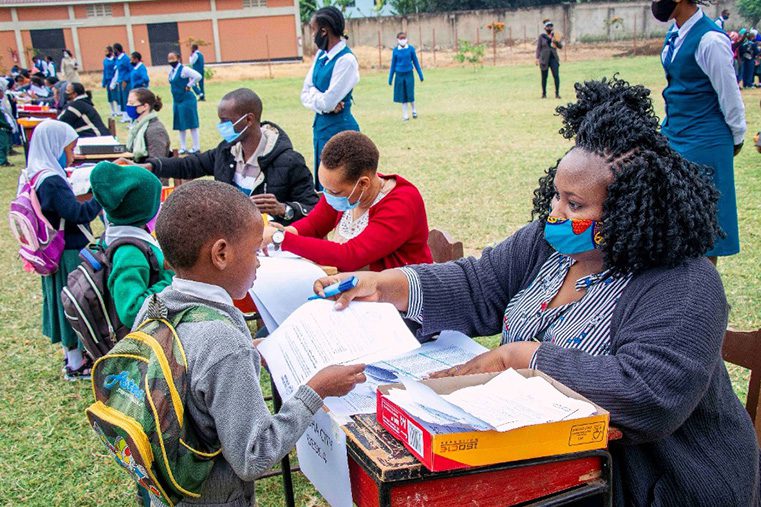
The planning process begins with inviting potential government school students. Theo’s team works closely with the Regional Education Officer to find the most academically gifted students St Jude’s should consider. “We get the top ten names from each stream at all the surrounding government schools in Arusha,” she says. “Then, we send an invitation letter to each student through their school and the headmasters give the letters to the respective students.”
The Community Relations team also makes an announcement on local radio about the upcoming Selection Day and, this year, a group of staff visited a number of markets to give out pamphlets and spread the word further to parents of potential St Jude’s students.
“Getting to interact with people was fantastic,” says Ziada, a member of the Marketing team who handed out pamphlets and spoke to community members about St Jude’s. “It was great to hear from the parents that our school is trying to reach.”
Finally, after months of planning, the big day arrives. This year, it’s 31 July. Today, 1,778 students and their parents have come to St Jude’s, all hopeful of receiving one of 50 academic scholarships to start at St Jude’s in 2022. A scholarship can change everything for a student and their family.
“Government school is free, but if you want lunch you have to pay. You need a uniform, you have to pay. Some parents will tell their children to skip their meals because they won’t be allowed to eat if they haven’t been able to pay. So some of these students will eat just once per day,” explains Theopister.
The school gates open at 7am and many people have been lining up since before 6am! When the students enter, their parents remain outside and the huge task begins.
“The process starts in the registration area. First we split the students up into districts; Arusha, Arusha City, Arusha DC and Arusha Meru and our staff help them move to the right area. Then we check their documents,” says Theopister.
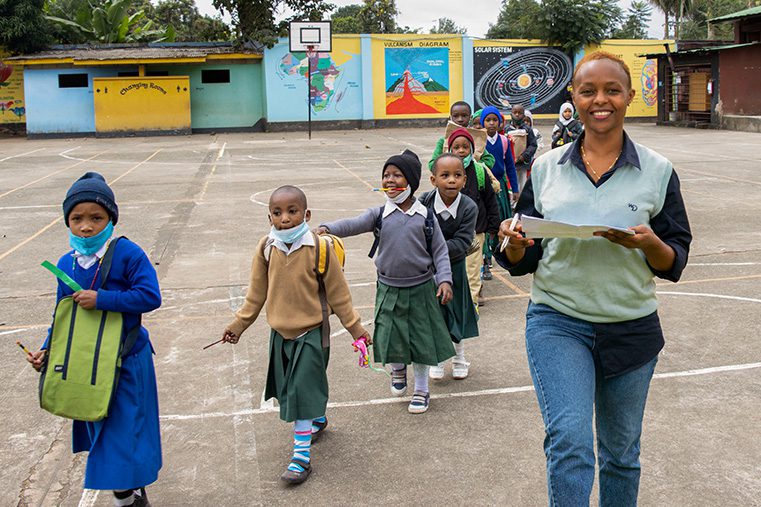
After that, it’s time for testing, gently overseen by our academic staff.
“We do arithmetic, counting one to ten and one to 20, recognising numbers. And writing a self-introduction in Swahili,” says Miss Juliet, a Standard 1 teacher who has now been involved in nine Standard 1 and 2 Student Selection Days.
It’s a huge day, but there are small moments when staff have time to think about what’s being achieved.
“My favourite time is when I’m in the hall, doing the reading test and I find a student who is just reading perfectly. It’s exciting,” smiles Miss Juliet.
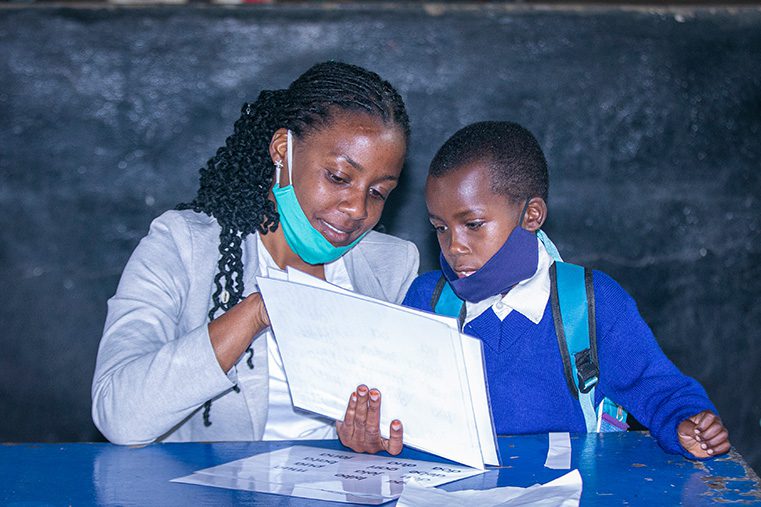
When the potential students are not being tested it’s the role of staff to keep them safe and contained. Luckily, the St Jude’s Primary School offers plenty of fun.
“Our school is blessed because we have playgrounds, and some of these students, they have never seen anything like this. So, we take them to the playgrounds and supervise them to keep them busy between testing,” she explains.
After testing, document checks and time on the playground, there’s a shortlist of potential students who meet document requirements and have passed their exams with distinction. They’re reunited with their parents and given a note, explaining when they should return to school for the next step in the selection process.
Like most staff, Miss Juliet is glad to be part of Student Selection Day at St Jude’s. In 2022, she’ll have the unique privilege of teaching the students she helped select today.
“When they come into my class, I feel excited. You get to see the change from the day you select them to the day they move to the next class,” she beams.
For 50 students, today is the beginning of that change.
Innovation begins with the spark of an idea.
Students at The School of St Jude have been demonstrating this since the first Science Day Projects Exhibition in 2010.
Science Day is an annual event that has been held at Smith Campus for the past 10 years. This year, the event took place for the first time at St Jude’s Girls' Secondary School to motivate girls to be more active in participating in STEM (science, technology, engineering and mathematics) subjects.
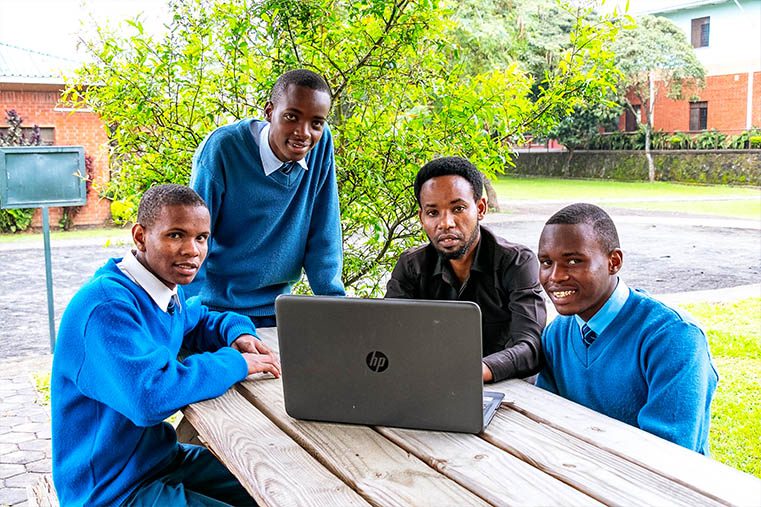
"Extraordinary inventions have been presented at Science Day by some of our best students," notes Mr Shaban, Science Day chairman of both Smith and Girls' campuses.
"Students use everyday items from school such as plastic bottles, cardboards, etc. However, we do support the students in other ways such as providing them with electronic devices so they can demonstrate their projects more efficiently," he adds.
"Science Day is important to these students because it motivates them to enjoy STEM subjects. It helps them put theory into practice. As an example, one student built a transformer using gas that worked," explains Mr Shaban.
In this year's exhibition, 97 project entries were registered for the competition.
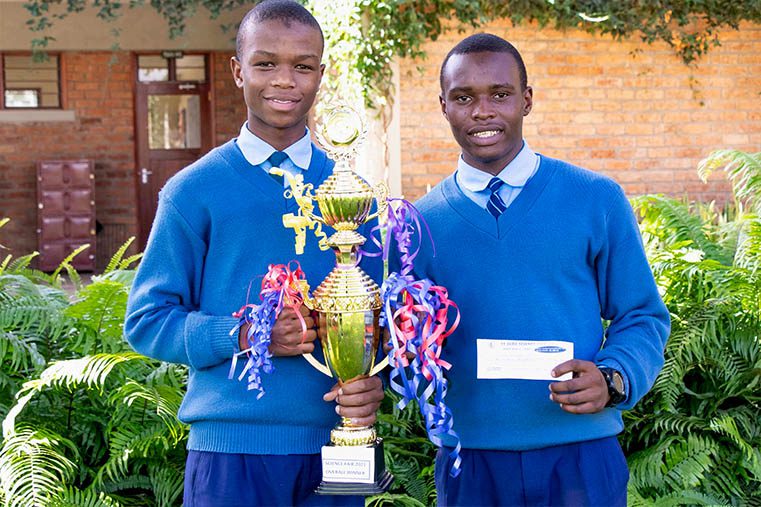
Gideon partnered with his classmate Rashid, both Form 2 students, to create their project called Automatic Secured Agriculture Controller. “This is my second time to win. The first time I won is when I was in Standard 7.”
Describing how the software functions work, "The unique thing about this project is that it provides security and controls agriculture activities such as chemical application and automated drying of crops."
These are impressive functionalities that would be very beneficial to Tanzania’s large population of agricultural industries and small-scale farmers.
Winners of the Science Fair are chosen from different categories - science, arts and design, mathematics, geography, biology, chemistry, and ICT.
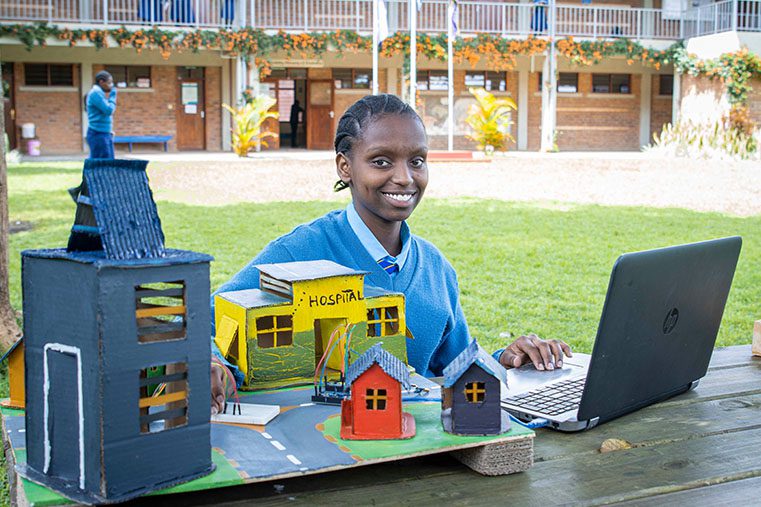
Debora, a Form 4 science student, was this year's winner from St Jude’s Girls' Secondary Campus.
Taking the top prize in the ICT category, Debora’s project, The Use of Mobile Network in Controlling Road Accidents, has been chosen to participate in the national competition.
“This project is meant to save lives by preventing traffic accidents,” she explains.
"I used various materials to design the project, including ultrasonic sensors to measure distances between cars, different jump wires, and sim card connections, as well as cardboard and bottle tops to demonstrate the concept," she further describes.
"I am truly thrilled that the project has been accepted to compete at the national level. So I'm trying hard to make some adjustments and modify the project so I can bring home the prize. We would also like to incorporate an alcohol detection sensor into the system,” Deborah excitedly says.
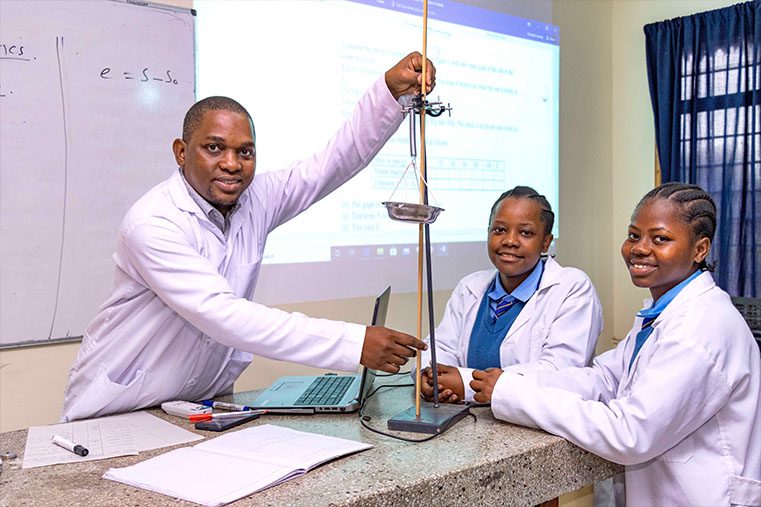
Mr Matotola is a mentor to science and ICT projects. He also coordinates the Science Day.
“Five projects from the Science Day have been selected to compete at the national level this year. One of them is Debora's project. So it’s truly exciting!,” says Mr Matotola.
“Girls are always eager to learn. We would like to see more girls interested in STEM subjects, so holding the Science Day on their campus will skew them in that direction," he enthusiastically remarks.
In this year's Science Day, 57% of girls participated, compared to 43% of boys. This shows how girls were driven and are ready to innovate incredible projects.
Every year, students present new creative, innovative and technological ideas at Science Day. St Jude's promotes creativity and encourages students to create projects that will benefit their communities to lift them out of poverty and improve their quality of life.
Increasingly, the best schools around the world are coming to the same conclusion; a holistic education that includes sports and arts alongside academics, helps students become well-rounded adults. Not to be left behind, St Jude’s has re-evaluated the way we provide our students with a well-rounded education. Over the last 12 months, our popular Sports Program has been updated, modernised and expanded.
Mr Jenerali is the driving force behind St Jude’s improved Sports Program.
“Sport is an avenue for students to let go, to get outside and de-stress, to burn a little energy. Then there’s the social aspect of it as well. Students learn soft skills too; communication, grit, leadership skills, they learn to take responsibility and to see what they can contribute to the team,” says Mr Jenerali.
A Driving Force: Mr Jenerali has spent the last 12 months revamping St Jude’s Sports Program.
Until now, St Jude’s students have participated and excelled in sports commonly played in Tanzania; football, basketball, netball, volleyball, handball and athletics. While these popular sports certainly have their place, Mr Jenerali was keen to diversify.
“It was important to introduce new sports,” he explains. “Mainly it’s about physical literacy. The philosophy of this program is about long-term athlete development. Younger students don’t specialise in a certain sport, they do rotations every two months. It’s all about fun and then they grow into specialising after a while. Then when they’re older, they tend to be more active in sports, even after school. It builds enjoyment of physical activity.”
Now, there is a year-round program of sports, which includes traditional sports in summer. In winter, students play martial arts, cricket, tennis, rugby and badminton. Athletics is offered all year.
To get these new sports started, St Jude’s needed specialist coaches. Previously, three coaches taught St Jude’s 1,800 students. Today, there are 22 coaches in addition to the schools’ PE teachers.
These new sports have been enthusiastically received. In particular, martial arts has proved unexpectedly popular among secondary students. “We’re actually struggling to have enough space for everyone who wants to do it,” laughs Mr Jenerali.
Sensei Issa is the martial arts coach. He started at St Jude’s just three months ago and has already seen improvement in his students. “Since they began taking my class, I have noticed progress. At the moment, I am teaching students how to defend themselves and I'm also working on getting them physically fit,” he explains.
Since 2004, Sensei Issa has taught students privately, but he has enjoyed working with St Jude’s. “I think St Jude's Sports Program is excellent,” he says, “It helps makes sports more popular in the school.”
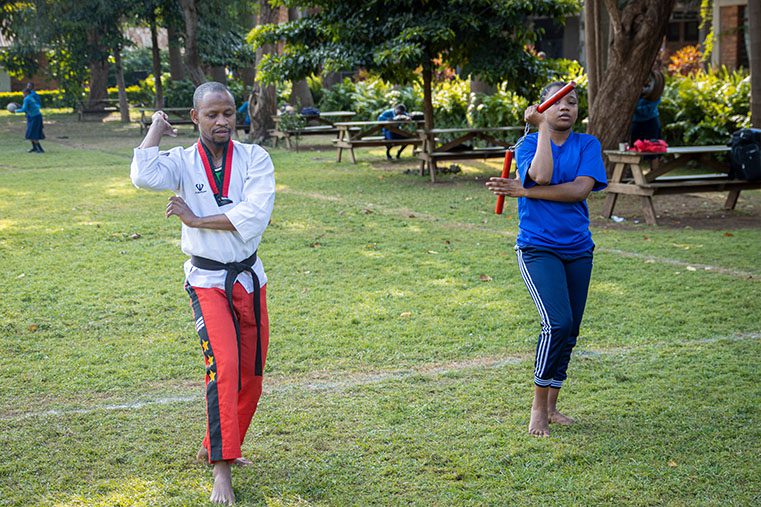
Students are enjoying their new-and-improved Sports Program. While not every student can be a star-player, everyone can have fun being active and learn from being on a team.
One such enthusiastic student is Costantine in Standard 5. In the summer, he loves to play football and during winter his favourite sport is athletics. He trains on Wednesday and Thursday afternoons and competes on most Saturday mornings.
“I like my athletics coach and I like training. It’s really fun,” he beams. “I hope one day I can be a professional football player. I play forward or mid-field and I am working on my speed.”
Costantine agrees with experts who say that sports help students academically. “When you play sports you can stay fit and healthy, so you don’t get sick and miss your studies,” he says.
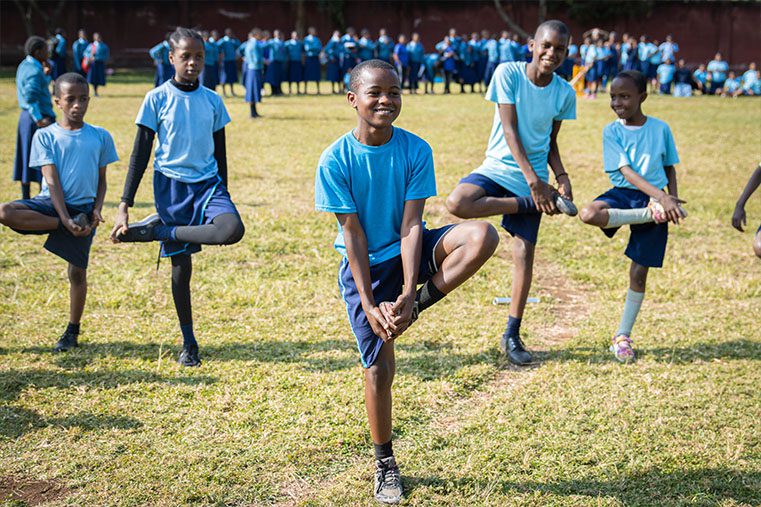
Over at St Jude’s Girls’ Secondary School, the new winter sports offerings have been welcomed by the students. Janet, in Form 3, is usually found on the basketball court, but this winter she’s giving martial arts a go. “I like martial arts, it’s really good. We can get fitness from it and also personal security,” she says.
Her favourite part is using the ‘dragon’ implement as seen in the photograph above. “It is hard at the start. You might accidentally hit yourself many times, but then you learn,” she laughs. “I feel more fit since I have started martial arts,” Janet continues. “My mind is more fit too, when I’m in class.”
One of Mr Jenerali’s proudest achievements at St Jude’s is, “…just seeing the enthusiasm from the students – that’s a big reward for me,” he smiles. Costantine and Janet are just two of the many enthusiastic students who make Mr Jenerali’s job so rewarding.
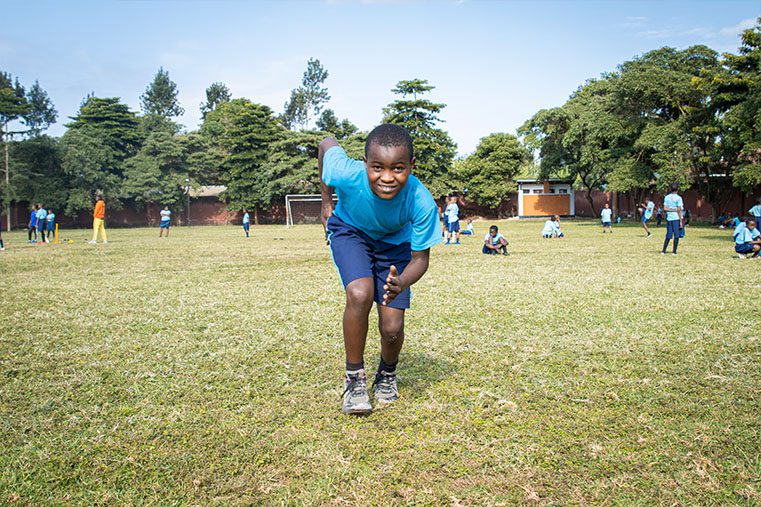
St Jude’s is constantly striving to provide our students with the best education possible. Studies from around the world show that the best education is a holistic one; an education which includes arts and sport alongside academics. Our Sports Program is an important part of a holistic St Jude’s education, which not only offers students an outlet but also complements their classroom studies.
Joshua, a charming and charismatic Standard 2 student, comes out of class and joins Jalilath, Hilary, and Getruda, eager to share his aspirations in life.
“When I grow up I would like to be a pilot. I will buy my mother, father and my grandmother each a plane of their own.” Joshua says, almost bursting with ambition.
Joshua is one out of the 71% of Standard 1 and 2 students who are currently not fully sponsored, along with 42% of all newly enrolled secondary students.
Each of these students has a story that needs your support.
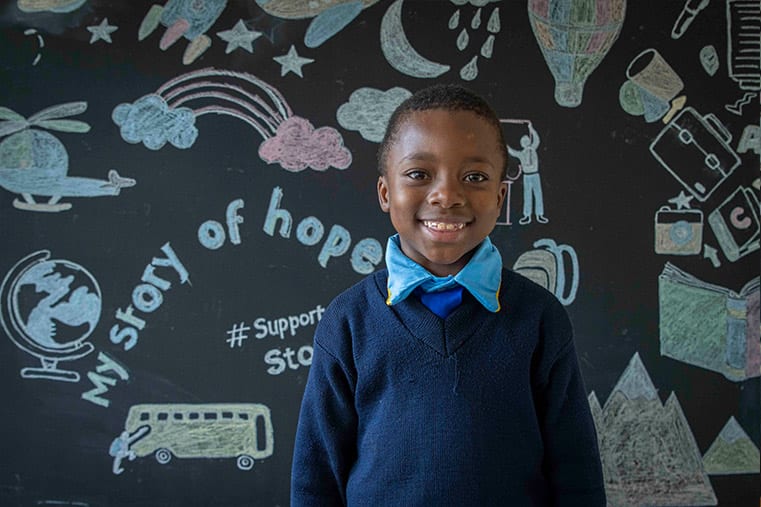
Joshua is seven years old. He joined The School of St Jude in Standard 2 in 2021. His favourite subject is arithmetic and he enjoys playing tennis.
“I’m happy that I’ve joined St Jude’s. I can eat, play, and learn without worrying about anything,” says Joshua.
“The first thing I’ll do when I become a pilot is to build my parents a beautiful home so they can live a comfortable life,” he passionately adds.
90 Standard 1 and 2 students were enrolled last year after a rigorous selection process to ensure that only the poorest and brightest students in Arusha receive academic scholarships to St Jude’s.
The school provides academic scholarships for four key stages of student’s education; Primary academic scholarships to support a primary student’s education from Standard 1 to the end of Standard 7; O Level secondary academic scholarship to support a secondary student’s education from Form 1 to the end of Form 4; A Level secondary academic scholarship to support a secondary student’s education for their final two years of school in Form 5 and Form 6; and Beyond St Jude’s scholarship to cover phases of Form 4 and Form 6 graduates’ higher education.
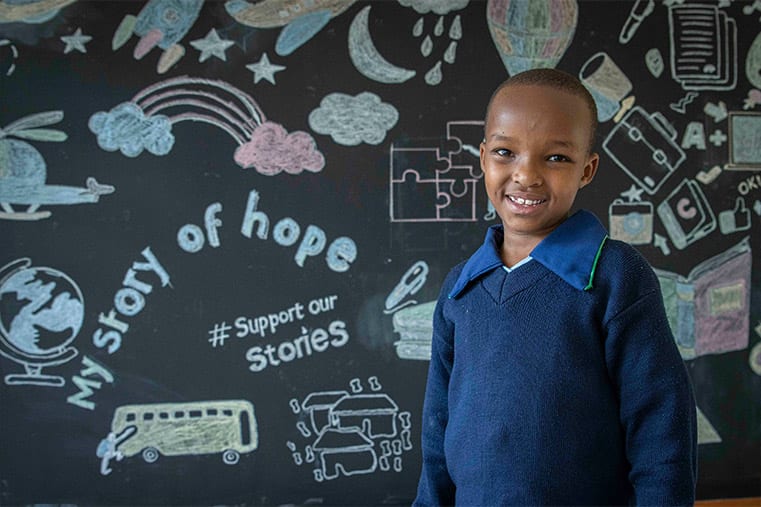
Jalilath is seven years old. She is in Standard 1 and her favourite sport is cricket.
“I love being in Standard 1. St Jude's is a great school that teaches really well compared to my old school,” Jalilath says shyly.
“When I grow up I would like to be a nurse because I want to take care of the sick and those who can’t help themselves. I’ll be the first nurse in my family,” she adds.
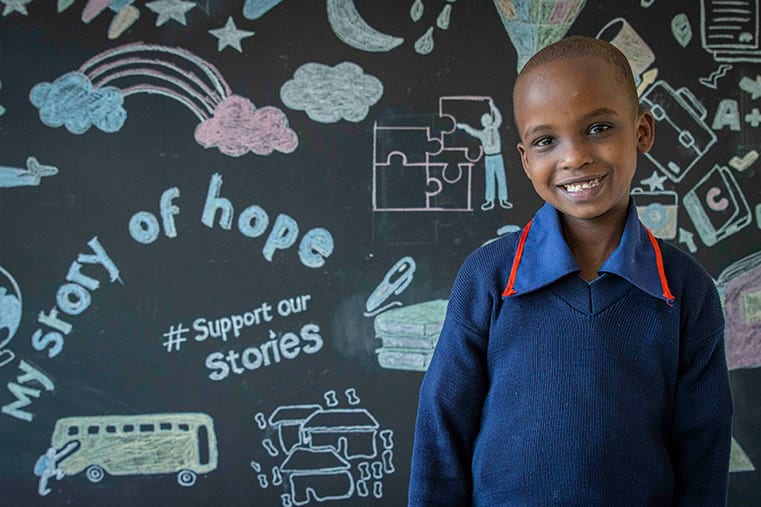
Also aspiring to be a nurse is Getruda, who is in in Standard 2. She is six years old with big plans for her future.
“I love arithmetic, health care, writing and reading. I want to become a nurse because I’ll get to help people,’ Getruda explains.
Getruda is a bright student who has been winning academic awards since she joined St Jude's in 2021. Her awards include Best Performance in Midterm Exams, Best Handwriting Always and Finishing Work on Time.
At St Jude’s, we strive for academic and moral excellence and promote the development of well rounded individuals who will become community-focused leaders of Tanzania.
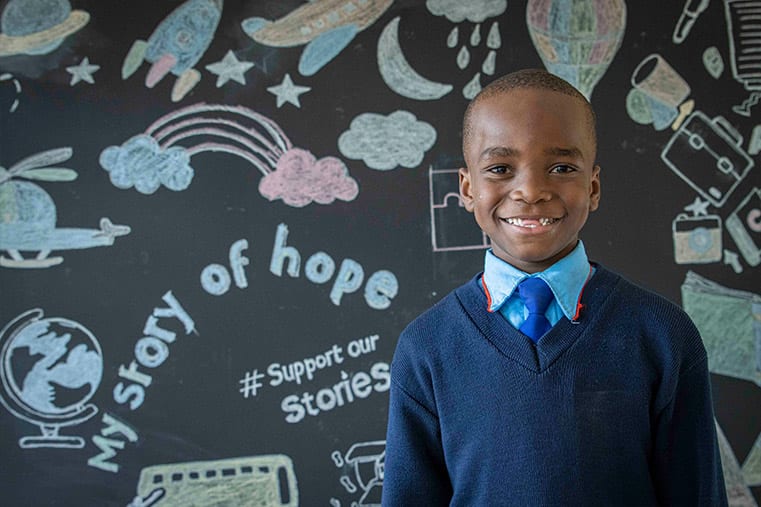
Hilary is a six years old. He’s in Standard 1. Hilary enjoys studying and playing football with his friends.
“My dream is to become a soldier when I finish school so I can protect my school and protect my country,” Hilary says.
Primary school is an early and important chapter in a successful educational story. It’s where important fundamentals are taught and a love of learning is established.
St Jude’s offers scholarships to students in their first two years of primary school. But, even these youngest students are not exempt from our current sponsorship gap. You can help fill this gap by sponsoring the academic scholarship of Joshua, Jalilath, Getruda or Hilary and help change the story for them and their families.
Students who join The School of St Jude in secondary, after seven years in government primary schools, are often our most determined students. They’ve worked diligently, with few resources in difficult learning conditions, and emerged with top marks in their final primary national examinations. When they receive an academic scholarship to St Jude’s, their determination is rewarded with free, quality education.
Benito, Elizabeth, Ester and Faustin are four of these determined students, beating the odds to become some of the fortunate 30% of students their age enrolled in secondary school.
Benito and Ester are in Form 1 at St Jude’s Secondary School and St Jude’s Girls’ Secondary School respectively. Both are just one term into their St Jude’s stories, and they’re already seeing the benefits of their scholarships. Elizabeth and Faustin, both in Form 2, are in their second year at St Jude’s and have learnt in leaps and bounds over the last 18 months.
Their academic scholarships provide Benito, Elizabeth, Ester and Faustin with all the elements needed for a successful educational story. However, like 42% of St Jude’s newly enrolled secondary students, these four remarkable students are not fully sponsored.
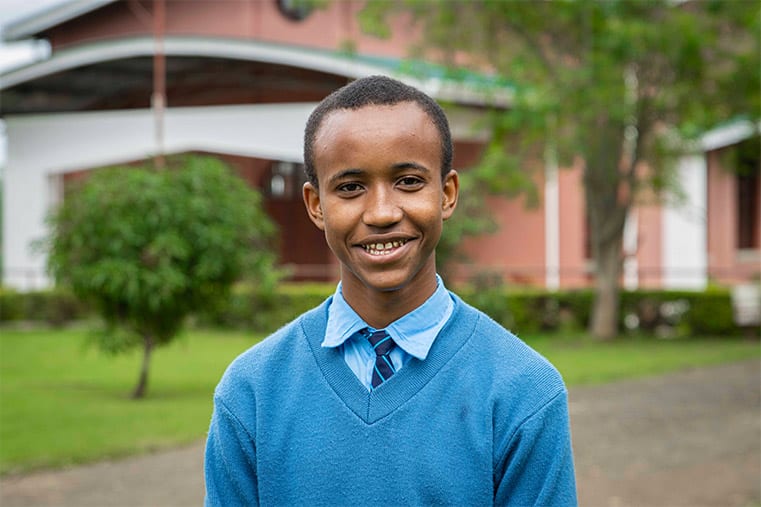
When new students start at St Jude’s, one of the first things they notice is the different school environment and the abundance of resources available.
“At my school, I had around 50 students in my class, and we didn’t have computers or a library,” explains Faustin, the eldest of five in his family.
In comparison, St Jude’s limits secondary class sizes to 30 students and is lucky to have well-equipped libraries, science and ICT labs on each campus.
For Benito, the second youngest of six children in his family, the road to secondary school at St Jude’s required a little extra determination. “I wanted to go to St Jude’s in primary, but I didn’t get in,” he explains. Though he didn’t pass the entrance exam to start primary school at St Jude’s, Benito wasn’t deterred. “I wanted to come because of the motto - fighting poverty through education,” he smiles. He worked hard during primary school, so that when he sat the secondary entrance exam, he passed and was offered a scholarship. “I felt so happy,” he says.
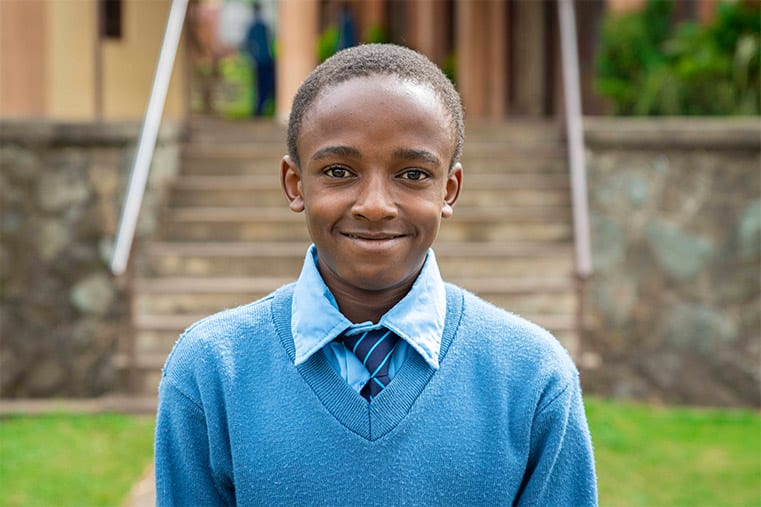
An important part of secondary school at St Jude’s is boarding. All secondary students board during term time in order to experience a safe and nurturing learning environment. At home, many students would spend hours on chores each day, reducing the window for study.
When Benito, is at home, he helps his single mother with chores. “I help by fetching water and carrying firewood. I walk for fifteen minutes to fetch water from a well and then carry it home,” he says. Now in boarding, Benito is happy to have his own bed and spend time with his friends.
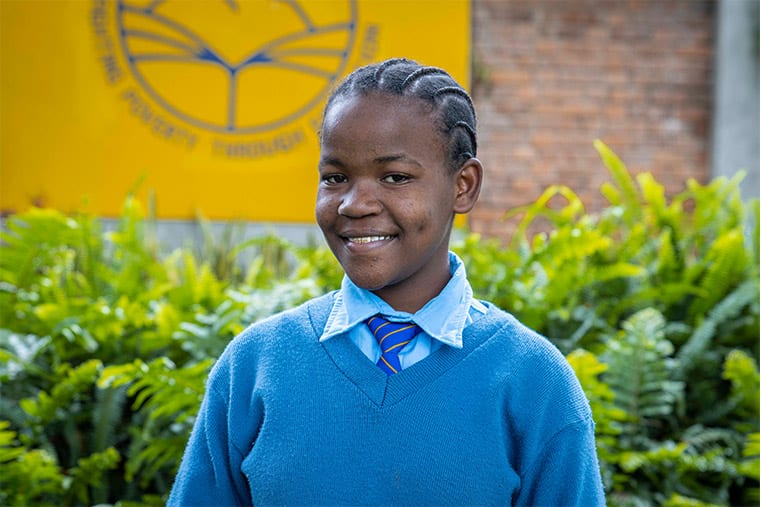
At St Jude’s, students can dedicate themselves to their studies and develop their interests and skills with the instruction of skilled teachers. “My favourite subject is geography,” smiles Ester, “and my favourite teacher is Mr Chokora, who teaches me geography.”
Even outside of class, extra-curricular clubs provide students with the opportunity to learn more and extends their interests. Both Faustin and Benito are enthusiastic members of the Computer Club, where Benito is working to improve his typing speed and Faustin learns to design websites.
For students who join St Jude’s in secondary, school excursions are a pleasant surprise, which often help them to solidify their career paths. “I want to be a pilot,” says Elizabeth. “I just went on an excursion to the airport and I saw some aeroplanes and learned about them.”
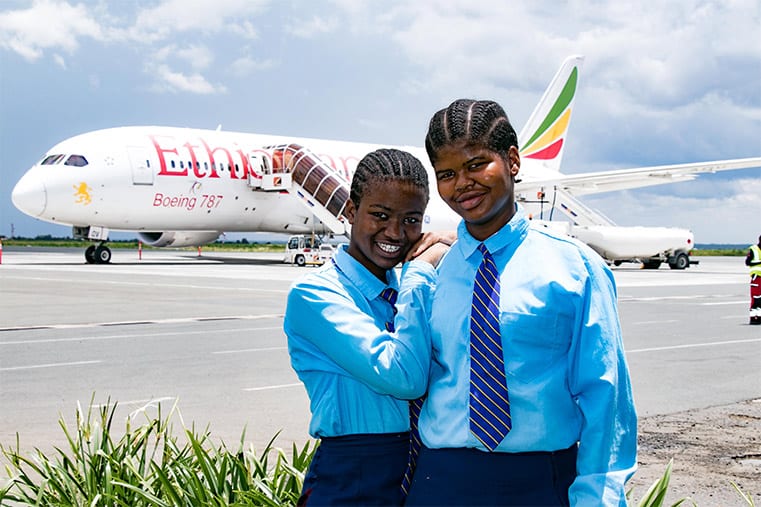
A Future in Flight: Elizabeth (right) enjoys a recent excursion to the airport in Arusha.
Of course, not all students will have decided on a career in the first two years of secondary school, but these four all have lots of ideas for the future. “After school, maybe I will be a teacher,” Benito says. “But also water is a challenge in my community, so I would like to solve that.”
“I think it’s important to help young people because the youth are the ones who are needed for tomorrow’s nation. It will be good if I can be a counsellor to help young people,” ponders Faustin.
There are many students like Benito, Elizabeth, Ester and Faustin in Tanzania. Students with big dreams, world-changing ideas and huge potential. Unfortunately, many of these students will miss out on secondary education and be unable to fulfill their potential.
As part of our mission, St Jude’s aims to give bright, poor students like these the opportunity to receive free, quality secondary education so that they can fulfil their potential. Whatever careers Benito, Elizabeth, Ester and Faustin eventually decide to pursue, these students have both the determination and the opportunity to create a bright future for themselves, their families and their communities.
Judica’s story of transformation runs parallel to St Jude’s own. When Judica started at St Jude’s in 2003, there was one campus and less than 100 students. Today, Judica visits as a successful banker and St Jude’s comprises three schools, three campuses, a ground-breaking graduate program and more than 800 alumni.
In 2003, Judica was just eight years old. One day, her brother Ezekiel lifted her onto his motorbike and brought her to St Jude’s for a Student Selection Day. Judica’s family knew that the school was offering free, quality education to students from poor families and hoped she would receive a scholarship too.
“There were so many of us at home – we were nine children and I am the ninth. You can imagine it – all of us in the same house – and life was not so good. My parents were farmers, but they were farming on a very small scale. The harvests were little and it wasn’t enough,” she recalls.
When Judica was offered a St Jude’s scholarship it was a huge relief.
Each day, Judica walked to school. While the school has 26 buses today, at that stage there was only one. Since 2004, all students and staff have enjoyed daily hot lunch at school, but in those early days Judica and her classmates walked home for lunch as the school didn’t yet have a kitchen!
Since then, a lot has changed for St Jude’s and for Judica. “If you had asked me what I wanted to be when I started at school, I would have said, ‘A policewoman’,” she laughs. When Judica reached secondary school, however, she discovered a talent for business.
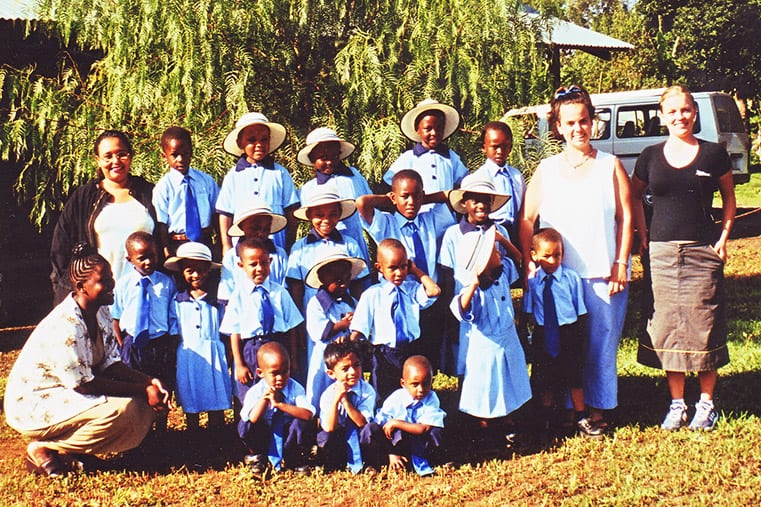
It wasn’t just her career aspirations which changed as Judica progressed through St Jude’s. Her story changed as she sought leadership opportunities and worked towards her future. Judica moved from primary school to O Level (the first four years of secondary school) and then A Level (the final two years of secondary school). Voted Head Girl in both O Level and A Level, Judica gained opportunities to practise her role as a future leader. In her final school years, she studied book keeping, commerce and accounting.
In 2015, after 13 years of free education, Judica completed secondary school with the inaugural graduating class. She remembers week-long celebrations with crowds of supporters arriving from all over the world to be there.
Ever a pioneer, Judica was one of the first students to take part in the Community Service Year (CSY). The CSY is the first year of the Beyond St Jude’s Program (BSJ) for Form 6 graduates. During the CSY, participants volunteer their time as teachers in government schools or in non-teaching placements throughout St Jude’s campuses. Judica taught book keeping and commerce at a government secondary school. “It was the best moment of my time with St Jude’s as I was giving back to the community,” she says.
Judica’s year of volunteering made a big impact on her students. She explains, “In local schools most students don’t make it to A Level, but most of my students passed and reached A Level. Many even made it to college, so I thank St Jude’s for that.”
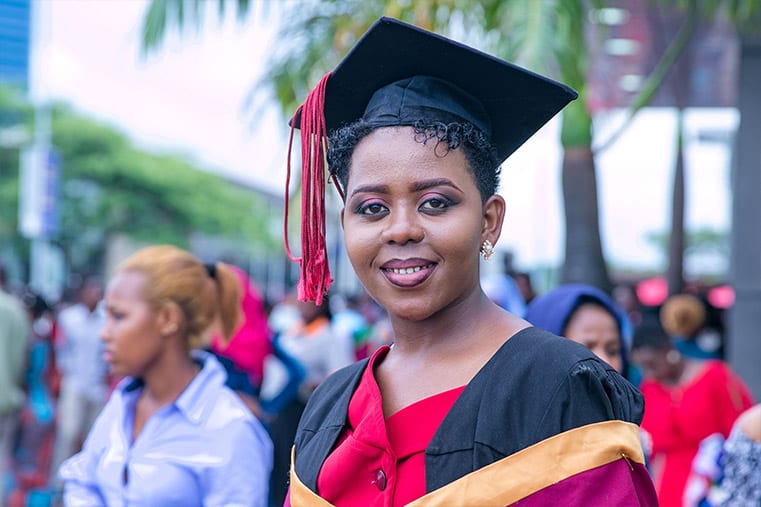
Soon it was time for Judica to begin her degree at the University of Dar Es Saalam, supported by Beyond St Jude’s. “BSJ helped with the whole process of applications for universities. They visited us at university to see how we were doing. That was really encouraging, to know that we had people who really cared about us, even after we finished school.”
In 2019, Judica proudly graduated from university with a Bachelor of Commerce in Banking and Financial Services and her family and BSJ representatives made the trip to celebrate. “It was so exciting,” she shares.
After university, Judica began working. “I was lucky because I got my first job just one week after I graduated. I was offered a job in one of the commercial banks as a Bank Officer,” she smiles. In a country where youth unemployment is high, this is a testament to Judica’s drive and great education.
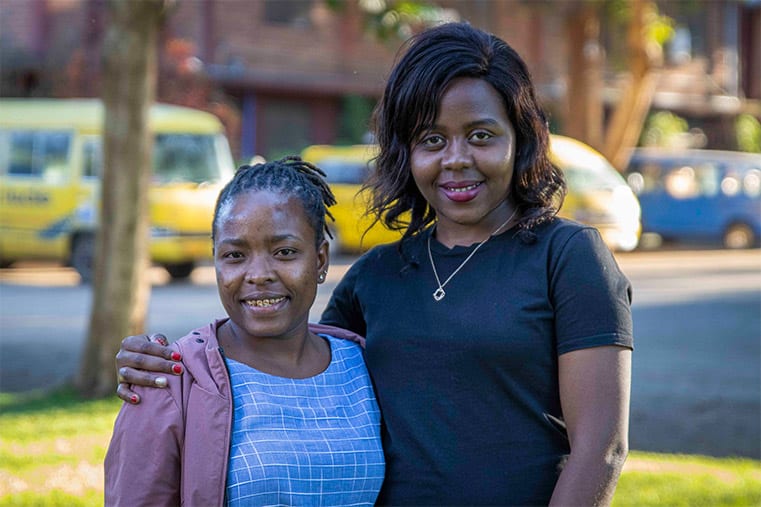
After a year, an opportunity arose at the prestigious Bank of Tanzania, where Judica happily works today. With her salary, Judica lives independently and provides her family financial support. Her older siblings are working and things have improved for her parents. “They are living comfortably now. My parents are still farming, yes, but on a larger scale, and it’s enough,” Judica reports.
In just eight months, Judica has grown into her new role, which takes her all over Tanzania. She is based in Arusha but also travels to Zanzibar and the capital, Dodoma, for work. Despite this busy schedule, Judica is happy to make time for her school, organising a trip home to film an interview for St Jude’s.
Just as St Jude’s been transformed since its beginnings, so too has Judica. With a free, quality education and her commitment to making the most of each opportunity offered to her, Judica has realised the St Jude’s vision. Where a bright but poor student once stood, now stands a young leader, fighting poverty in Tanzania.